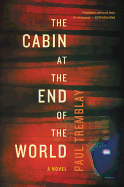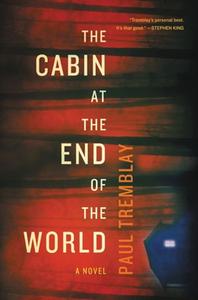
 Paul Tremblay continues his unbroken string of fascinating horror novels--A Head Full of Ghosts, Disappearance at Devil's Rock--with the nightmarish The Cabin at the End of the World. Tremblay is adept at breathing new life into ancient horror tropes, as he did with demonic possession in A Head Full of Ghosts. In The Cabin at the End of the World, Tremblay has fashioned an unholy marriage between the home invasion genre and apocalyptic thrillers.
Paul Tremblay continues his unbroken string of fascinating horror novels--A Head Full of Ghosts, Disappearance at Devil's Rock--with the nightmarish The Cabin at the End of the World. Tremblay is adept at breathing new life into ancient horror tropes, as he did with demonic possession in A Head Full of Ghosts. In The Cabin at the End of the World, Tremblay has fashioned an unholy marriage between the home invasion genre and apocalyptic thrillers.The novel opens with Wen, a seven-year-old girl, on a vacation with her two adoptive fathers at a remote cabin. Wen is interrupted while collecting grasshoppers by an imposingly large but friendly man, who tells her, with unnerving kindness: "None of what's going to happen is your fault. You haven't done anything wrong, but the three of you will have to make some tough decisions." That turns out to be a dramatic understatement: soon there's a violent siege of the cabin, and Wen and her fathers, Eric and Andrew, struggle desperately to keep their family safe.
What at first seems like an unusual riff on the home invasion thriller evolves into a story that can't easily be pigeonholed. Without ruining any of Tremblay's nasty surprises, it is safe to say that the four strangers turn out to have very earnest motivations that they believe to involve the fate of the human race. As in his previous novels, Tremblay likes to leave room for alternate interpretations. Are the strangers deluded fanatics or is there an apocalypse waiting in the wings? The question comes to torment Eric and Andrew, just as it might torment the reader.
The Cabin at the End of the World unfolds cinematically, taking place over hours rather than weeks. It's no surprise that the film rights have already been snapped up. Throughout the compressed time frame, Tremblay jumps from character to character, allowing us to see how they respond differently to the traumatic events. He also leaves plenty of room for reverie, digging back into each character's memories to shed light on the relationships, insecurities and spiritual outlook of every character. They do make foolish choices, but they never make inexplicable ones.
As harrowing as the novel may be, there is a lot of warmth in its depiction of Eric, Andrew and Wen's small family. There is also a surprising amount of dark humor, such as when the strangers frantically assure Eric and Andrew that they are not being targeted out of homophobia: "I assure you that we're not here with hate or prejudice in our hearts," one of the characters avows after having them tied to chairs. Readers might even be surprised by how much empathy is extended to the attacking strangers, who are the furthest thing from faceless antagonists. The Cabin at the End of the World deftly moves between private insecurities and existential terror, poking holes in the flimsy sense of security families rely upon. --Hank Stephenson, bookseller, Flyleaf Books
Shelf Talker: The Cabin at the End of the World combines a home invasion thriller with apocalyptic fears, following one family's terrible ordeal at the hands of a bizarre group of strangers.

